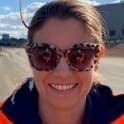Insider profil
Keen to receive questions about
Top Insider Advice
I had a lot of difficulty in my earlier years engaging with STEM subjects, and while at uni understanding what my potential options were, because I struggled to find many role models that I could relate to, particularly female role models that I could look to for influence. While I am grateful for my roundabout journey into earth science, having some mentors and STEM positive influences around me would have taken away a lot of the stress and frustration, and provided me more of a sense of direction earlier on. Now, I have a lot more people around me who can speak to their pathways, whether it's regarding earth science, academia, industry focus, work-life balance, or simply life administration in an ever-busying world. It is very centering for me to be able to speak to people about their experiences or life challenges. Now that I am in more of a position to offer my own advice on pathways into STEM careers etc, I try to be involved as much as I can in various organisations and events that seek to engage young people, and particularly young females in STEM and industry roles. I hope to be the role model for others that I couldn't seek out myself.
Career path
Exploration Geologist
IGO
Started 11/2017 to PresentCompany
What do you like about your job and the company?
In my current role I interrogate a lot of data that has been collected using various microanalysis techniques - all of which needs a critical eye and can not be taken at face value. This means I am constantly researching and needing to stay on my toes when it comes to learning new concepts about mineralogy. I then get to relate that back to the larger scale of mineral exploration - does what I learned today at the micro scale have implications for how we explore at the macro scale for various mineral deposit styles?
Greatest achievements
I competed my Honours year at UWA in 2019, and when my supervisors suggested I should work towards having it published I thought it was going to be another one of these things in life that never get finished. It took me 2 years to get the paper up to publication standard while I was working in the field as a graduate student, I can't tell you how many times I was sitting around the camp fire working on revisions, there was a lot of self doubt, a lot of steep learning curves and a lot of lost sleep. But I lived to tell the tale and can now say my work has been published, which is a very, very proud moment.
Scott L
Land Access & Heritage Officer
Top Insider Advice
Whether it be a long term career that you already have your eye on, or are undecided on the long term direction your career will take, IGO has a huge amount of opportunities available to its staff. I have had a fairly long working career. It has taking me in a few different directions in which I have worked in privately owned business's as well as one of Australia's biggest companies. Never have I seen the opportunities as well as the support to ensure our staff get the best possible opportunity to achieve the working goal. I am a living testament to this.
Natasha C
Mine Geologist
Top Insider Advice
Always pick a job/ role that will provide you more experience within your role and sometimes beyond your role this will create an environment for growth.
Kate M
Top Insider Advice
IGO is a values based organisation and throughout our recruitment process we will be looking at how you align to those values. When applying to IGO try to demonstrate this in your resume and cover letter, stand out from the crowd! When applying to IGO it is equally as important for you to get to know us as much as we would like to get to know you. If you are selected for an interview do some research on IGO and be inquisitive by asking questions that demonstrate your current knowledge of IGO.




